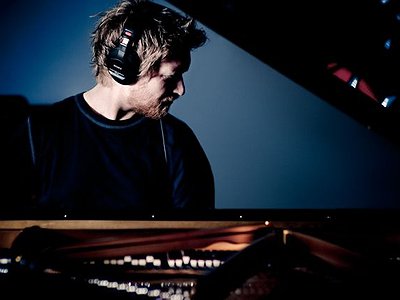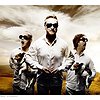When did you start playing your instrument, and what or who were your early passions or influences?
I started out playing on an old electronic house organ when I was about 5 or 6 years old. I continued playing this instrument throughout my school years, and when I was about 13 years old I bought a synthesizer. My first experiences with the acoustic piano happened around that time too, I took lessons from an English jazz pianist/organist who lived in my hometown at that time.
In the beginning I listened to Elvis and The Beatles, and some other rock music from the '70s. My first major musical kick was Pink Floyd; I still remember the devastating feeling when I listened to Dark Side of The Moon for the first time. My English friend and teacher provided me my first jazz experience, when he played Oscar Peterson for me. After this, I started at a music college in Stange, where I started focusing primarily on the acoustic piano.
What do you personally consider to be the incisive moments in your artistic work and/or career?
First of all, the releases of the two latest albums with my trio, Hello Troll (2008) and Natsukashii (2011). They are both results of many years of digging into this trio. We have worked together with the same line-up since 1999, and on these recordings, the interplay and the way we breathe together has reached a new level for us.
I am also profoundly proud of the work I have done with the amazing saxophone player Rolf-Erik Nystrøm, in the duo HERO. The album called The Discovery and Exploration of Planet HERO, which is a free improvised live recording, is especially favourable to me.
Keith Rowe once asserted that it is often certain people that “give one permission to do things”. How was that for you – in which way did the work of particular artists before you “allow” you to take decisions which were vital for your creative development?
I must admit that especially Keith Jarret has been a huge inspiration for me. His way of approaching the art of music making has opened up a great deal of opportunities and ideas. I must also mention my teacher and mentor at the State Academy of Music in Oslo, the Russian master Misha Alperin. He turned everything I knew until then totally upside down, and gave me a whole new set of ideas and concepts to work with. The things he taught me at that time are still a foundation in my work and musical philosophy today.
What are currently your main artistic challenges?
For the near future I think one of my most important challenges is to play solo concerts. After working for many years in bands, it is a quite new experience to build up a complete concert set alone with the piano. Recording and releasing Kattenslager is only the first step on this road; I am thrilled, exited and also a bit nervous for the continuing of this concept.
What do improvisation and composition mean to you and what, to you, are their respective merits?
For me, improvisation and composition are inevitably intertwined. I always strive to be a composer when I improvise, and I always use improvisation as one of my main tools when I compose. The composing part is important first of all for the structures and forms of the music. It's the very framework, which makes sure the listener can be safely transported through the musical stories without falling a sleep or loosing focus. Improvisation is many things; one of the most important one is to provide the ability to make fast decisions during a musical performance, in order to create surprises and an unpredictable and living stream of music.
How important are practising and instrumental technique for achieving your musical goals?
It is very important. I have rehearsed a lot during the last 20 years, and especially the years from 17 to 28 were very important. Much of my basic technique was created during all the hours of rehearsing in that period of my life. In later years, I find it perhaps more developing to play concerts and to do recordings. The most important focus now is to develop my ability to make choices. What and how I choose to play at an exact point in a tune or in a concert is what I focus on and always try to analyse and improve.
How do you see the relationship between sound, space and performance?
I always work with some of Norway’s best sound engineers. In a live situation, this is a crucial aspect in order to give the audience the best possible experience of the music we play, and I often regard the sound engineer as the fourth musician, when playing with a trio, that is.
The possibilities of making good sound will of course vary a lot depending on what kind of room we are in and on the available equipment, but it will always improve the sound no matter what. For us on stage, it also makes a big difference what kind of room we play in. If we play in a big room, we often have to use what we call a broader pencil, which means that we have to play perhaps more clear and strict, especially rhythmically, but also dynamically. In smaller venues there is more room for playing around with finer details in the music, giving it a more intimate feeling. I like both situations very much; they have their own advantages and possibilities.
Derek Bailey defined improvising as the search for material which is endlessly transformable. Regardless of whether or not you agree with his perspective, what kind of materials have turned to be particularly transformable and stimulating for you?
I am fascinated by contrasts. I’m always searching the balance between the beautiful and the ugly, darkness and light, humour and seriousness, warm and cold and so on. This concept is in itself endlessly transformable. Another concept I spend a lot of energy on is the concept of dynamics. This is of course a general concept, but I can use it everywhere, with a wide range of musical parameters as tools. I use dynamics actively to create three-dimensionality in my music, and to create clarity by choosing which elements of the music to enhance and which to blur.
Purportedly, John Stevens of the Spontaneous Music Ensemble had two basic rules to playing in his ensemble: (1) If you can't hear another musician, you're playing too loud, and (2) if the music you're producing doesn't regularly relate to what you're hearing others create, why be in the group. What's your perspective on this statement and how, more generally, does playing in a group compare to a solo situation?
I fully agree with John Stevens’ statements. Whenever musicians are playing together in a group, we should always consider that we are a part of one organism, that there is one composer above us all that we have to take responsibility for. The goal is always, whichever project I play in, to do the right things for the specific music that is being played. A result of this is that I find myself playing very differently from one project to another. I always try to put my own personality into it of course, but the things I choose to play and what I allow myself to play will vary a lot.
I had the pleasure of playing with the singer Silje Nergaard for some years, and in her project the music is very clear and detailed regarding the elements it may contain. If I moved too far away from the base, it would make the music much less precise and it wouldn’t sound authentic anymore.
In my trio, there is much more space for variation regarding the expressive elements, but also we have some limits and some unspoken rules that we intuitively follow. When I play solo, you'd think that I have perhaps even more freedom, however I'm not really sure about that. I play very differently solo, I tend to be even more strict with myself and what I will allow. The elements I can choose are more open here, but when I start to play, the first notes or mood I create is defining the rules of the rest of the form, and I focus a lot on keeping the red thread from that point.



